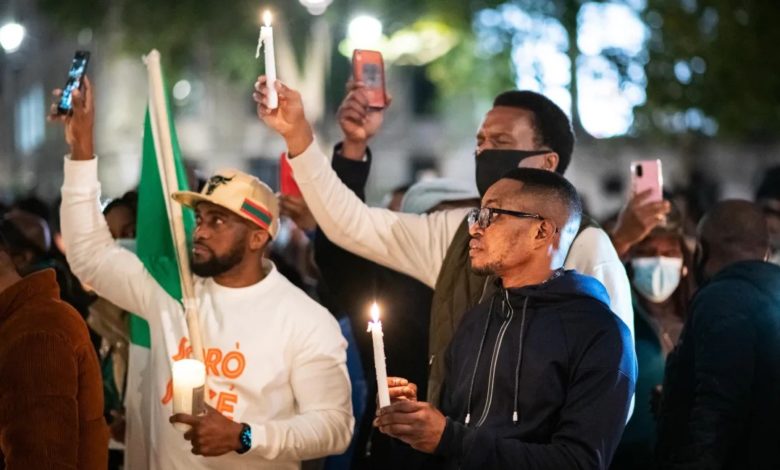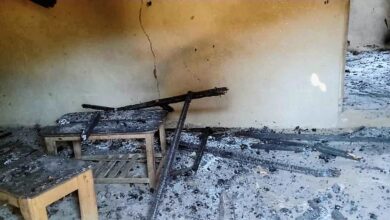A Nation Mourns: Young Nigerians Grapple With Collective Trauma In Wake Of Unrest

On the night of Tuesday, October 20, Jerry O* witnessed scenes that seemed straight out of a movie.
Men of the Nigerian army fired live rounds at protesters holding up Nigerian flags and singing the national anthem in a Lagos suburb, the crack of gunfire drowning out the demonstrators’ quaking voices. The sound followed Jerry as he ran from the spot where he was crouched, eyes catching motionless bodies and shells on the floor. It roared behind him as he escaped the bloodletting in the pitch-black night.
Two weeks later, Jerry is only starting to move on from the events of what is now called ‘Black Tuesday’. Like him, many young people who advocated for the disbandment of a rogue police unit, the Special Anti-Robbery Squad (SARS), have been thrown into shock by the army’s response to peaceful protests.
“They came with the intention to kill as many people as possible,” Jerry told HumAngle a few days after the shootings, the shock of the night still palpable in his voice. “I could see soldiers pick bodies, they were ahead of me and I was hiding in a bush. People tried to charge at them but they would fire many rounds and people would run back.”
To cope with Black Tuesday, Jerry said he has sought professional help. It is all he, like many others who witnessed the events of that night and the violence that followed, can do to stay sane and to heal. In turn, dozens of mental health organisations have stepped up to help, spreading ‘mental first-aid’ tips on social media channels and on messaging platforms like WhatsApp.
Psychologist Chinyereugo Udensi of Neem Foundation says there’s no hard data yet, but that many patients have “reached out a lot” concerning the events of October 20 and what followed. Many can’t sleep, she said, and feel anxious about the violence. Because many mental health organisations reached out to people for help, practices like hers were not overwhelmed, she said.
West Africa’s biggest economy and most populous nation descended into chaos following the Tuesday killings. Public anger at the state and security forces morphed into widespread killings, looting and arson resulting in violence that Lagos and other south-west cities have not seen in decades.
Thousands of young people had taken to the streets in the country from October 7, demanding an end to police brutality and state-wide repression of young people. Despite the eventual disbandment on October 11 of SARSㅡthe police squad most accused of atrocities against the youth, protesters refused to leave the streets, asking that states immediately try accused police officers, compensate victims’ families and evaluate the mental fitness of police members.
Mobs began to hijack the largely-peaceful protests, turning them violent in parts of Lagos as the demonstrations entered the second week. The state governor, Babajide Sanwoolu declared a 4 PM curfew on October 20, but peaceful End SARS protesters positioned at the popular Lekki Toll Gate refused to back down. At around 7 PM, soldiers gunned down some of the demonstrators. Amnesty International reported that 10 died and dozens were injured.
A riot broke out. Mobs reacted with anger, burning down public buildings and maiming policemen over Wednesday, Thursday and Friday. Warehouses packed with bags of food meant to be shared to cushion the harsh effects of the COVID-19 pandemic were ransacked and emptied. President Muhammadu Buhari said 69 people died in the riots.
The events have unleashed mental anguish on many as videos of maimed officers and dead protesters circulated on social media. Many now are bonding over social media and sharing tips to cope: Yoga, music, anything to help process and let go of the fear that the Lekki episode was calculated to have spread.
“We’re witnessing individual and collective trauma. We’re having people who have anxiety attacks, panic attacks,” says Hauwa Ojeifo, a mental health activist and founder of She Writes Woman, a mental health helpline for women that’s been sharing self-help tips and helplines online. “Seeing all the bruises and injuries (on social media) … these things stay in our subconscious so we are all living through what could be like the consequences of being at war.”
The sense of trauma is heightened by blame games between the Nigerian Army and Governor Sanwoolu over who ordered the soldiers to fire. Army chief Tukur Burutai who initially claimed there were no soldiers at the scene later changed his story, revealing that Governor Sanwoolu ordered the intervention. The Lagos governor had previously hinted that the order came from the highest echelons of the military or presidency.
The claims and counter-claims make Olayiwola Oromidayo, a 25-year-old entrepreneur and blogger in Ibadan “feel betrayed, angry, traumatized and demoralized,” he said. “I feel the government has defeated democracy if it could open fire on unarmed protesters.”
Lagos has bounced back from the violence quickly, although a relaxed curfew remains in place. Damaged businesses are rebuilding and the debrisㅡfoodstuff, bags, razed carsㅡis being cleared off the streets. The process of restitution and healing has also kicked off as a reconciliation panel last Tuesday began to look into cases of SARS brutality in Lagos.
But the mental strain of the past two weeks will linger for years, Ojeifo says, a situation the country’s fragile health care system is ill-equipped to handle.
“My mental therapy has been to speak out the truth,” says Jerry O*, who has shared his eyewitness account on his Instagram page and continues to see a therapist. “I feel more at ease now saying my truth.”
*Not his real name
Support Our Journalism
There are millions of ordinary people affected by conflict in Africa whose stories are missing in the mainstream media. HumAngle is determined to tell those challenging and under-reported stories, hoping that the people impacted by these conflicts will find the safety and security they deserve.
To ensure that we continue to provide public service coverage, we have a small favour to ask you. We want you to be part of our journalistic endeavour by contributing a token to us.
Your donation will further promote a robust, free, and independent media.
Donate Here




